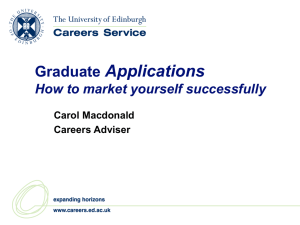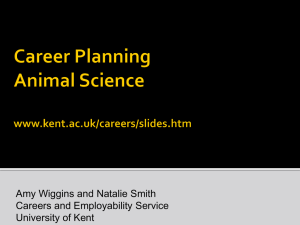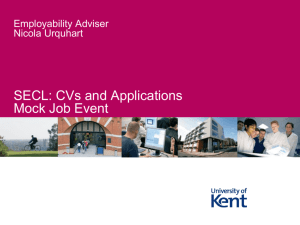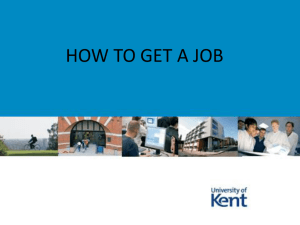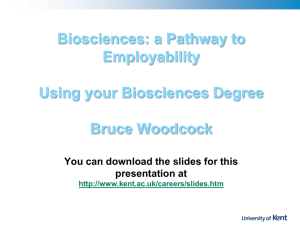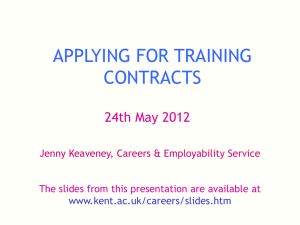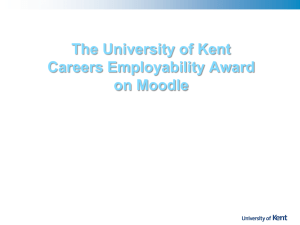Application Forms - University of Kent
advertisement
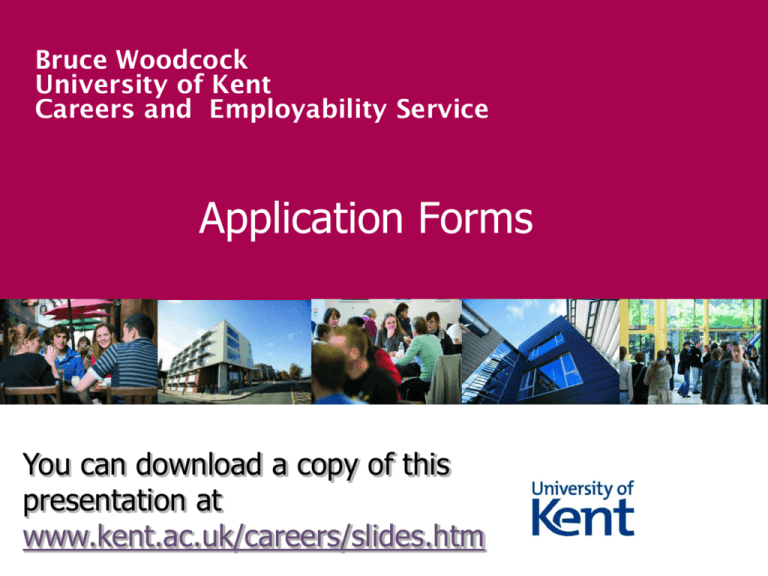
Bruce Woodcock University of Kent Careers and Employability Service Application Forms You can download a copy of this presentation at www.kent.ac.uk/careers/slides.htm Selection methods of top employers in 2014 How not to do it …. Working on a farm has improved my communication skills which are especially important when working with large livestock. Applying for job at biscuit company: my life-long love of chocolate biscuits, is the main reason for my interest in the company It's best for employers that I not work with people On an application for a position requiring considerable people skills - My hobbies include watching television, computer chess, stamp collecting and walking my 2 spaniels. Reason for leaving last job: my employers insisted that all employees get to work by 8.45 am and I could not work under those conditions. I would like to be a prat of your respected company (email I received recently!) I have an excellent track record, although I am not a horse. Why do you want to work for us? • Knowledge of company: products, services, clients, competitors not “Because you are a prestigious international company with a good training scheme” www.kent.ac.uk/careers/sk/commercialawareness.htm • How your skills and attributes fit the role and the company e.g. competitive or collaborative www.kent.ac.uk/careers/interviews/cultural-fit.htm Evidence of careful research What is wrong with this? Investment bank CV scorecard Finance firms often use ‘scorecards’ to rank CVs and decide who to interview. Here is an example scorecard. 15% Class of your degree and ‘rank’ of university you went to. 10% Grades achieved at A level or equivalent. (more weighting given to ‘classic’ A level subjects: economics will score higher than business studies, for example.) 20% Amount of relevant work experience. 10% Speaking foreign languages. 20%. Extracurricular activities. (A high score requires high achieving, exciting and multiple, extracurricular achievements.) 15% Presentation of your CV. 10% Demonstrating conviction about the role you’re applying for. How to “sell” your degree • List relevant modules (plus marks if good!) • Projects – especially if relevant • Technical/IT skills • Soft skills – evidence of teamwork, project management, problem solving etc.. Why you need to use a spell checker • I am a prefectionist and rarely if if ever forget details. • Proven ability to track down and correct erors. • I have good writen comunication skills. • Lurnt Word computor and spreadsheet pogroms. • Develop an annual operating expense fudget… And why you must read it carefully as well • Extra Circular Activities • At secondary school I was a prefix • Over summer I worked for an examinations bored. (Kent BA English graduate!) • In my spare time I enjoy hiding my horse • I want experience in a big sex practice • I am a conscious individual. • Reason for leaving last job: maturity leave • I have a desire to work with commuters • Dear Madman (instead of Madam) • I hope to hear from you shorty WORK EXPERIENCE Summer 2013 Sainsbury's, Canterbury Checkout assistant This job developed my ability to deal with the public and work under pressure Don’t feel you have to include every job “In addition to the above, I have held a variety of temporary jobs during school and university vacations, including fruit-picking, factory work, bar work and waiting on tables” INTERESTS • Reading, cinema, travel • Travel: traveled through Europe by train this summer in a group of four people, visiting historic sites and improving my French and Italian • Reading: helped younger pupils with reading difficulties at school • Cinema: member of the University FilmMaking Society • Diverse interests: evidence of people skills, organising, leadership, initiative, responsibility. The Application form Work Experience How? Why? Was this the main benefit? “My role as a intern at xxx was of the most benefit as I increased my confidence. My team had a high degree of autonomy and it was a demanding working environment where I was often required to work long hours, followed by presentations to senior managers. The role particularly allowed me to experience the many different functions that exist within a business. It was also a great opportunity to experience new cultures.” How is this relevant? But did you have autonomy + demanding work? What did you present and how? And? What did you learn? How has this influenced your career decisions? COMPETENCY QUESTIONS ON FORMS Describe a situation where you had to ..... • show leadership • make a difficult decision • overcome a difficult obstacle • refuse to compromise • work with others to solve a problem COMPETENCY QUESTIONS: STAR APPROACH • Start by briefly outlining the Situation • Keep the focus on your specific Tasks and responsibilities • Say what Action you took, then try to summarise what you achieved. If it’s a group task, make sure you define your own role and contribution. This is the biggest part • Give concrete Results when possible. If you cannot be totally positive about the experience, say what you learned from it and what you might do differently next time. • Situation/Tasks/Action/Result = www.kent.ac.uk/careers/compet/skillquest.htm Competency-based questions The bad….. • The biggest challenge whilst carrying out the assignment was conducting a financial analysis on the company. I was assigned this task, as I had previous experience in this area as I have carried out two financial and accounting modules during my University degree. I conducted a full ratio analysis on the company, which included analysing Next's Profit and Loss Account and Balance Sheet. I presented the ratios and included details of the company's current financial position, along with an explanation of how the company could improve their position. The Presentation involved presenting our group's report on Next Plc to the rest of the Marketing group. Our group conducted a Microsoft Powerpoint presentation, to ensure it was conducted in the most efficient and systematic way. Each member presented their individual section, the final section then included contributions by all group members. Our group had practised the presentation on numerous occasions prior to the final presentation, which ensured a smooth running. Each member of the Marketing class was given a feedback form to report their opinions of the presentation. Our group received all positive feedback and were all awarded a 2:1 for the presentation, this contributed towards the final outcome of or Marketing modules. Apathy- did not put self forward for task. No ownership, leadership. No individual result. Competency-based questions The ridiculous... • Mealtimes are a difficult and challenging time as this is one affair when my friends and I are truly tested in our decision making skills. • There has been more than one occasion where a unified agreement on what to do about dinner has proven to be a problem. I therefore take it upon myself to be the spokesperson for the group. One example would be where two of my friends wanted chicken nuggets and hence wished to go to McDonald’s while three others preferred the Chicken Royale from Burger King as opposed the the McChicken Sandwich one can get at McDonalds. Using my initiative, intuition and lateral thinking I suggested that we all go to KFC instead. My reasoning was that this was that KFC do chicken popcorn and are a far better choice than chicken nuggets. While their Fillet Tower Burgers are a step up from the standard Burger King Chicken Royale as they have a hash brown in them as well. Thus using some originality of thought, a certain degree of diplomacy and a persuasive tongue I convinced them all to join me at KFC. Does not bring the group with them. No recognition of others’ opinions. Competency-based questions The good: Throughout my A Levels, I worked part-time with Flora Motley, initially as a sales assistant although after one year I was promoted to Weekend Accounts Manager. Within my extended duties, which also included bookkeeping and budget plans, one of my principal tasks was to increase the intake of Store Account Card customers, as Head Office was concerned that the branch was under-performing in this area. To tackle this assignment, I took the initiative to introduce new selling techniques and to increase staff awareness in relation to the account card and our customers' specific needs. This involved running fortnightly training sessions and monthly meetings to monitor our progress as a branch. I also developed an incentive scheme, which offered prizes or additional paid time off, to reward staff upon completion of continually increasing targets. As a result of this work, the branch's customer account card uptake rose by 45% over the year, and our store's nationwide ranking in this criteria escalated from 40th to 6th position. My efforts received commendation in the Flora Motley Monthly Newsletter. High performer The problem Identified a solution … … and implemented it A positive outcome Action Verbs created instructed analysed produced negotiated designed calculated maintained administered ……. www.kent.ac.uk/careers/cv/actionverbs.htm CAREERS WEB SITE • Help with applications and interviews www.kent.ac.uk/careers/applicn.htm • Example CVs and Covering Letters www.kent.ac.uk/careers/cvexamples.htm CV Checklist www.kent.ac.uk/careers/cv/cv-checklist.htm VIDEOS • APPLICATIONS • INTERVIEWS • ON-LINE APPLICATIONS • SELECTION CENTRES • All last about 25 minutes and are excellent! www.kent.ac.uk/careers/IntVid.htm Careers Employability Award on Moodle • Half the unemployment rate for students who complete the award www.kent.ac.uk/careers/moodle.htm • DP2650 Email bw@kent.ac.uk if you have problems enrolling DP2650 Careers Employability Award on Moodle Get your CV quickly and professionally reviewed online in the CV assignment Learn how to give high quality answers to application form competency questions in the Competency Skills assignment and get a question answer reviewed for quality. Employability Fest 26th Oct. – 6th Nov. www.kent.ac.uk/ces/empfest 100 careers events all over campus Careers Fair 134 employers Tues 3rd Nov 12 to 3 pm, Sports Halls www.kent.ac.uk/ces/careersfair AXA, Allianz, Accenture, CIMA, Deloitte, Fidessa, GT, Halifax, ICAEW, Lloyds, Morgan Stanley, PwC, RSM, Institute of Actuaries, Kent-Teach, DSTL, Airbus, IBM, Civil Service etc. Bruce Woodcock University of Kent Careers and Employability Service CVs and Covering Letters You can download a copy of this presentation at www.kent.ac.uk/careers/slides.htm IBM Mentoring Scheme at Kent For further details and info. on how to apply, see www.kent.ac.uk/careers/IBM.htm In 2015-6, IBM will be working with students at the University of Kent, mentoring first-year students looking to do a placement as part of their degree and second year students who will be applying for employment in their final year. You can be studying for any degree subject and don't need advanced computing skills. The aim is to increase awareness of employability, the recruitment process, key competencies employers are looking for and advice/tips for securing a placement or graduate scheme position. The mentors will either be currently on the IBM placement scheme or will have joined as a graduate and will be encouraged to share their own experiences with their mentees.The scheme is not about encouraging you to join IBM but will give you valuable skills to apply successfully to any organisation. IBM is keen to encourage undergraduates to begin considering their careers sooner. We want to make students aware of how competitive today’s job market is and give them guidance on how best to promote themselves. This will give them the best chance of applying not just to our schemes but other employers’ too. The scheme also provides students with a fantastic chance to improve and enhance their skillsets before they begin applying. It is a virtual mentoring scheme: most contact with students is either via email, telephone or by Skype. Mentoring is a relationship, and communication between mentors and mentees is key. Students who are selected will be encouraged to manage their relationship with their mentor. Application is by CV and short answers to 2 questions: how you would benefit from being mentored and what are your interests? I have learnt a lot of useful things from the scheme. My mentor is amazing person who is always ready to guide you help as much as possible. I feel lucky to be within this scheme. She has advised me across all issues which did concern me before the scheme. After consistent cooperation with her I gained valuable knowledge regarding how to improve my employability. Moreover, the importantly I have secured a place for a summer insight program in PwC. I would have not been able to do that without her help. Talking to someone who has relatively recently been where we are now has been very helpful as they understand the decisions we have to make and how overwhelming it can be. Having the mentor focus on areas we specifically want to improve or learn about has been extremely helpful and has provided me with the next steps to take towards my desired career. Moodle Careers Employability Award 14 Quizzes: need 75% to pass • Employability skills quiz • Employability skills quiz: drag and drop • How to develop the skills employers want? • Test your spelling and grammar! • What makes you happy at work? • How commercially aware are you? • Special interests topic lesson • Interview preparation • Practice interview • What are the most common interview questions? • Aptitude tests and assessment centres • CV quiz • CVs and covering letters: drag and drop quiz • Career planning drag and drop quiz Assignments: complete 3 of these • Analyse your skills and learn how to make top quality applications • Do you want to live to work or work to live? • Researching careers • Choosing a career • Submit a CV • Social media Action planning DX_CEA Careers Employability •Award (2014/15) www.kent.ac.uk/careers/moodle.htm Types of CV Reverse Chronological outline your career history in date order, normally beginning with the most recent items. The "conventional" approach and the easiest to prepare. Skills-based highly-focused CVs which relate your skills and abilities to a specific job. work well for mature applicants and for those whose qualifications and work experience are not directly relevant to their application. P 14 Applications Booklet EMAILING CVS • Many employers are happy to accept CVs as an attachment to an email. –Put your covering letter as the body of your email. Format it as plain text (use the format heading on Outlook Express to do this), so it can be read by any email reader. –Your CV is then sent as an attachment, in MS Word format, Rich Text (.rtf) or html format are acceptable. Say you'll send a printed CV if required. –Email it back to yourself first to check it. Research by forum3 found: • The average graduate will send out 70 CVs when looking for their first graduate job. The average number of responses is 7 including 4 rejections and the remainder inviting the graduate to interview or further contact. • The more CVs you send out the more interviews you get. • Applicants who included a covering letter with their CV were 10% more likely to get a reply. • Applicants who addressed their application to the correct named person were 15% more likely to get a letter of acknowledgement and 5% more likely to get an interview. • Applicants sending CVs and letters without spelling mistakes are 61% more likely to get a reply and 26% more likely to get an interview. The most common mistakes not found in a spell check were: fro instead of for, grate: great, liased: liaised, stationary: stationery. What is the purpose of a CV? To inform the employer about your: • education • work experience • skills • interests To persuade the employer that you are potentially suitable for the job and are therefore worth Interviewing. Quiz! • How long should a CV be? • How long should a covering letter be? • What is the sweet spot of a CV? • What is a reverse chronological CV? • Use spelling and grammar checker carefully • Can cut and paste sentences from CV examples to make sure English is correct. www.kent.ac.uk/careers/cv/cvexamples.htm Think about the job CVs are normally targeted on a particular job What tasks would the daily routine involve? What skills would the job call for? What type of personality would suit the job? Answers for 300 jobs on: www.prospects.ac.uk/links/occupations PROVING YOUR ABILITY There are four main things employers look at in CVs: • Education - ability to think clearly, analyse and assess information, draw conclusions, work independently, research, etc • Work experience - ability to get on with people, work under pressure, meet deadlines, etc • Leisure interests - ability to plan and organise, cooperate with others, compete, work hard to achieve results ... • Specific skills – e.g. driving licence, computing or foreign language skills CV Marking Criteria • Pleasing appearance: and clear logical layout. The 10 second quality test: hold the CV at arms length and look at it for a few seconds. Does it look pleasing to the eye? • Clear structure with appropriate headings and logical development. Carefully organised. Identified sections (e.g. Education, Work Experience). At least a line gap between sections. Name in big letters at start. Normally Education before Work Experience for a student CV. • Don't separate education and qualifications: try to keep all the information about a particular topic together in one place on the CV, rather than fragmented throughout. • Absence of spelling, grammatical and syntax errors. Correct capitalisation • Modules, projects, technical skills gained and grades (if good!) for vocational courses. Neat alignment. • Reverse chronological order – most recent jobs first. • Lively writing style. Use of positive, active language. Easy to easy to read and pick out important information. Appropriately selected examples to provide evidence that you have the skills, interests and personal attributes to do the job and fit into the organisation. • Describe key tasks, responsibilities and skills gained from work experience e.g. customer service skills. • Concise and to the point - no more that 2 sides of A4. Short, clear phrases. Use of bold and italic to draw eye to key points. Good use of bullets. Proper bullets rather than hyphens Just one or two sensible fonts e.g. Tahoma 10 points. Not too small font sizes. Larger fonts for subheadings. • No dense paragraphs - a good rule is no more than 7 or 8 lines in a paragraph. If more, separate into smaller paragraphs, use bullets or bold out key words. • Interests. A broad variety? Social and active rather than solitary and passive interests? Serious commitment to at least one activity? Evidence of getting on well with other people? e.g. team sports. Independent or challenging holidays/foreign travel? Organising or leadership experience/evidence of taking responsibility? SKILLS-BASED CVs Examples of evidence of skills: • Verbal Communication - assisted visitors of many nationalities as a seasonal Tourist Information Assistant, advising on places of interest, transport and accommodation and helping resolve any problems • Time Management - have successfully combined studies with a part-time job and involvement in a number of drama and music productions Competencies • Good attitude to teamwork. Friendly and cheerful personality • Proactive: able to use initiative. “No problem, I’ll do it!” Problem solvers, not problem creators! • Flexible and adaptable: learns new skills quickly. • Enthusiastic, motivated Excellent communication skills – dealing confidently with students, take phone messages • Organised and efficient. Able to plan and organise their own workload. Work to strict deadlines • Microsoft Office: ECDL. Familiarity with databases, Excel and the web When should a CV be used? • When an employer asks for applications to be received in this format • When an employer simply states "apply to ..." without specifying the format • When making speculative applications (i.e. when writing to an employer who has not actually advertised a vacancy but who you hope may have one) Choose a sensible email address: Such as: • eek_eek_i_am_dieing_eek_arg_errrg@milk.com • death_metal_kitty@milk.com • demented_bovine@gnumail.com • platypus_mcdandruff@mail.com • flockynockyhillipilification@gnumail.com • virgin_on_the_ridiculous@hotmilk.com • yourmywifenowgraham@gnumail.com • original_madcow_jane@gnumail.com • rage_against_the_trolley_fish@gnumail.com • sexylikewoaaaah@hotmilk.com PRESENTATION OF YOUR CV • Use short sentences and concise phrases • Use bold type and bullet points, but in moderation • BSc. And MSc. Not Bsc or MSC! • Don’t use lower case I: “i am ……” THE COVERING LETTER One side of A4 maximum First Paragraph Third Paragraph State the job you’re applying for. Summarise your strengths and how they might be an advantage to the organisation. Where you found out about it. When you're available to start work (& end if it's a placement) Second Paragraph Relate your skills to the job. Last Paragraph Why your interested in that type of work Mention any dates that you won't be available for interview Why the company attracts you (if it's a small company say you prefer to work for a small friendly organisation!) Thank the employer and say you look forward to hearing from them soon.
